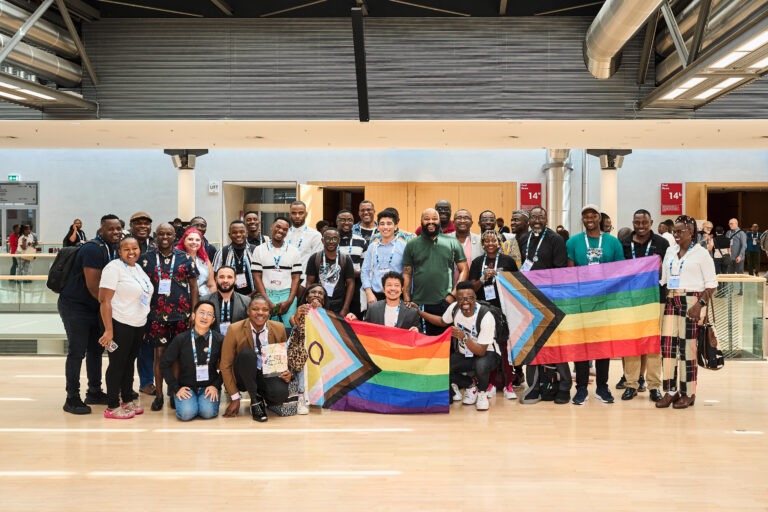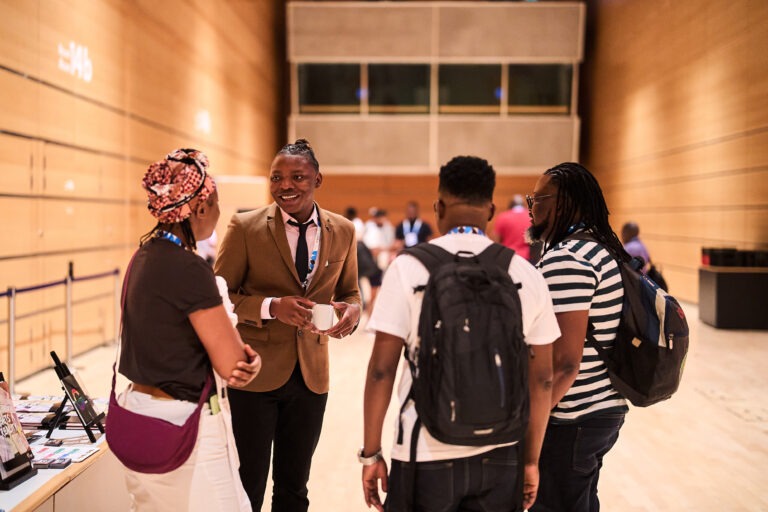
The GBGMC believes meaningful change starts with conversations. The executive director, Michael Ighodaro, prioritises engaging with key populations and allies, building connections, sharing knowledge and shaping the future of HIV prevention and LGBTQI+ health globally.
In response to an opportunity to influence policy, generate evidence and build capacity for key populations in Africa and globally, the Africa Centre and Global Black Gay Men Connect (GBGMC) have entered into a three-year partnership.
By combining the academic and research expertise of Stellenbosch University and the community-led advocacy and global networks of the GBGMC, the organisations will undertake several joint initiatives in health management, with a focus on marginalised key populations.
The seeds for the partnership were first sown in 2023 via the International Conference on Aids and STIs in Africa (ICASA) in Harare, Zimbabwe. Africa Centre director Dr Munya Saruchera and Brian Kanyemba, senior technical advisor at the GBGMC and an Africa Centre alumnus, both served on ICASA’s international steering committee. At one of the planning meetings in Accra, Ghana, Munya and Brian connected over their respective organisations’ shared commitment to reducing health inequalities, especially in marginalised communities.
Declaring war on gender injustice
There has been noticeable progress globally with recognising gender rights and identities. The achievement of some milestones should however not divert attention from the discrimination, stigma and injustice that persist.
According to Brian, the ongoing challenges faced by gender-diverse populations are fuelled by multiple factors. These include ignorance about gender identities and diversities, a lack of policies that protect gender rights and identities (which indirectly contributes to gender criminalisation and increases harassment), religious and cultural intolerance, a lack of science and research outside of the health sector (which creates an association between gender and disease), ineffective deterrence (such as training that doesn’t yield results), as well as a lack of funding to conduct research and address health needs in affected communities (which contributes to the perception of gender diversity as an external or imported agenda).
Addressing these intricacies requires a multifaceted approach, which is why the Africa Centre-GBGMC partnership aims to tackle the shortcomings from a scientific, community and training perspective.
Munya points out that the human, relational factors at play are particularly challenging. “Social, attitude and behavioural issues are some of the most complex challenges in health management and these inevitably manifest in discrimination, othering, stigma and injustice,” he explained. “The collaboration between the GBGMC and Africa Centre students should go a long way in influencing and changing mindsets.”
Central to inclusive health management
The GBGMC partnership speaks to the heart of the Africa Centre’s broadened strategic direction and vision, launched officially at the beginning of 2025. To date, the Africa Centre has largely focused on stigma and related issues in the context of HIV/Aids. Now, as Munya says, the accumulated experience and skills can easily be applied to the wider sociocultural determinants of health and rights of gay men and other gender-diverse populations.
Putting Africa on the global stage
Although the GBGMC has a global footprint, it has close ties with the African continent. The executive director, Michael Ighodaro, was born and raised in Nigeria, and there are staff members in Kenya, South Africa and Zimbabwe. The GBGMC is also in the process of registering an entity in South Africa. “Africa has always been a key part of our work. We have long-standing collaborations with community partners [in Africa] that we support to influence policy and advocacy,” said Brian. Partnering with the Africa Centre was therefore a natural progression.
Similarly, the Africa Centre, which emphasises the critical role of African knowledge systems in creating health management solutions that are appropriate for the continent, also maintains an international focus. With partners and students from across the globe, it seeks relevant relationships that help address strategic gaps and priorities, irrespective of location.
The power of collaboration
The strength of the collaboration lies in each party’s strategic value-adds. While the Africa Centre offers academic expertise, supervision and infrastructure, the GBGMC brings a wealth of knowledge on marginalised and criminalised communities and the healthcare barriers they face.
Main areas of collaboration
- Research: Conduct joint studies, operational research and evaluation projects on health priorities of key populations
- Capacity strengthening: Develop training programmes, offer fellowships and mentorship and co-supervise postgraduate students to improve the quality of information on gender-diverse communities.
- Policy and advocacy: Produce policy briefs and advocacy strategies to accelerate access to information and tools relating to HIV prevention and to address structural barriers.
- Conferences and events: Co-host regional and international events, seminars, webinars and symposia to share key findings from research and capacity-strengthening efforts.
- Knowledge dissemination: Co-author publications, academic articles and community-led reports.
- Resource mobilisation: Raise funds to support mutually agreed initiatives, including grants, student bursaries and community projects.
The areas of collaboration complement one another and will contribute to the partnership’s impact in different ways. Research stands out as a crucial foundation for both organisations. “We believe that using science as a tool to advocate for policy change is critical to delivering credible and impactful results,” Brian explained. “Research also supports the collation of critical but anecdotal community data and using it to provide quality services.” Munya affirmed the importance of research from the Africa Centre’s perspective: It can help address issues relating to communicating and newsifying technical research findings.
Joining the dots in the interconnected world of health management
The Africa Centre-GBGMC partnership demonstrates the importance and necessity of a holistic and inclusive health management agenda. Brian completed both the postgraduate diploma and masters’ programme in HIV/Aids Management at the Africa Centre – and the knowledge he gained has stood him in good stead. “I have applied the [PgDip and MPhil] learnings in public health programming for key populations, including in advising on policy and programme design and directing community-based interventions.”
This is excellent proof of the interconnectedness of the various health challenges and priorities we face. It also highlights the importance of sharing insights, expertise, lessons and experiences in redesigning and improving health systems. Nevertheless, it’s a mammoth task. As Munya says: “It is a long road and every step counts.” That’s why collaborations like the Africa Centre-GBGMC partnership are vital – we make better progress when we move forward together.

The GBGMC stands proud with partners and communities across the world, advancing equity, visibility and advocacy for black gay men and all key populations.
